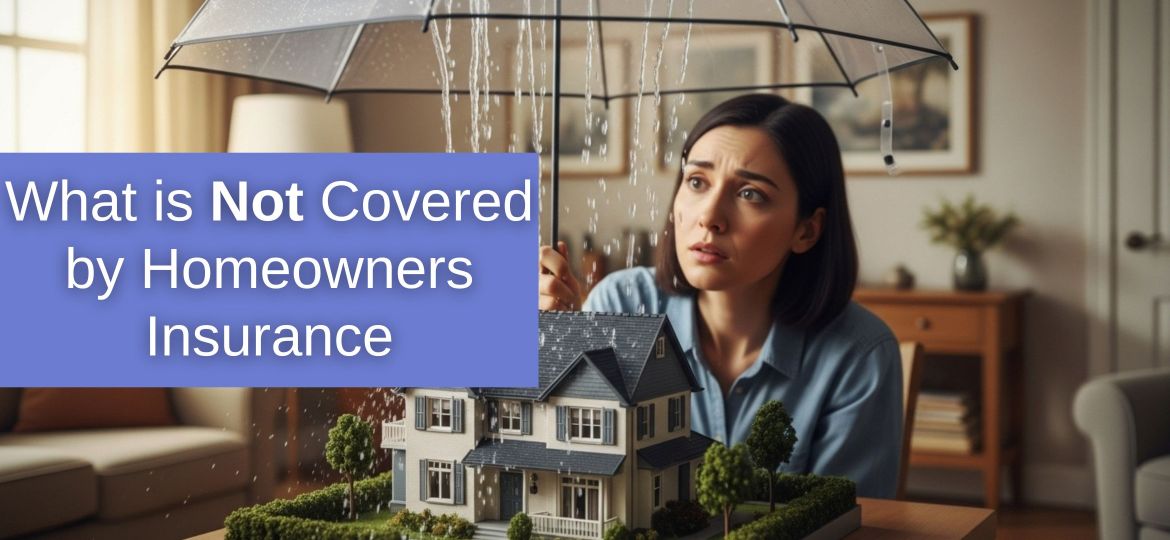
Having a homeowners insurance policy provides an incredible sense of security. You know that if a fire breaks out, a tree falls on your roof, or your belongings are stolen, you have a financial safety net to help you recover. A standard policy is designed to protect you from some of life’s most common and unexpected disasters. But what about the things it doesn’t cover?
Many homeowners are surprised to learn that their standard policy has specific exclusions, leaving them vulnerable to certain types of loss. Understanding these limitations is the key to ensuring you don’t have gaps in your protection. This guide will walk you through what is typically excluded from a standard homeowners policy so you can be fully informed and make the best decisions to protect your home and family.
Standard Exclusions: What Your Policy Likely Won’t Cover
Every policy is different, but most standard homeowners insurance contracts explicitly exclude coverage for certain events. These are often large-scale or maintenance-related issues that require separate, specialized policies.
Natural Disasters
- Floods: This is the most common and misunderstood exclusion. A standard homeowners policy does not cover damage from flooding caused by overflowing rivers, heavy rainfall, or coastal storm surges. Given our proximity to the coast, this is a critical exclusion to note. Flood coverage must be purchased separately, typically through the National Flood Insurance Program (NFIP) or a private insurer.
- Hurricanes: This peril is complex because a hurricane causes damage from both wind and water. While wind damage is typically covered by your standard policy, the devastating damage from storm surge and hurricane-induced flooding is not. It’s also important to note that a separate, higher “Hurricane Deductible” may apply to covered wind damage. To be fully protected from a storm, you must have both your homeowners policy and a separate flood policy.
- Earthquakes and Earth Movement: Your policy will not cover damage from earthquakes, landslides, mudslides, or sinkholes. If your home is in an area prone to seismic activity or soil shifts, you will need to add a special endorsement or purchase a separate policy for earthquake coverage.
Maintenance and Wear & Tear
Homeowners insurance is designed to cover sudden and accidental damage, not the inevitable decay that happens over time. Your policy won’t cover issues related to poor maintenance or general wear and tear. For example, if your roof has been deteriorating for years and finally gives out, or if a slow, long-term leak causes damage, the repairs would not be covered. It’s the homeowner’s responsibility to properly maintain the property.
Pest Infestations
Damage caused by termites, rodents, birds, or other pests is considered a maintenance issue and is not covered by homeowners insurance. The cost to exterminate pests and repair the damage they cause, such as chewed wiring or damaged support beams, will be an out-of-pocket expense.
Sewer Backup
Imagine the damage and mess from a backed-up sewer line or drain. Unfortunately, the cost to clean up and repair your home from this unpleasant event is typically excluded from a standard policy. However, you can often purchase a relatively low-cost “water backup and sump pump overflow” endorsement to add this valuable protection.
“It Depends”: Coverages That May or May Not Be Included
Beyond the list of standard exclusions, there is a category of events where coverage isn’t a simple “yes” or “no.” For these situations, whether you are covered often depends on the specific circumstances of the damage and the fine print of your policy. It’s crucial to understand these nuances.
Mold
Mold is a tricky subject in the insurance world. If mold develops as a direct result of a covered peril, like if a pipe suddenly bursts and the resulting water damage leads to mold, your policy will likely cover the cost of removal, up to a certain limit. However, if mold grows due to a long-term issue like persistent high humidity, a slow leak you didn’t repair, or general lack of maintenance, it is almost always excluded.
High-Value Personal Property
Do you own expensive jewelry, fine art, antiques, or collectibles? Your standard homeowners policy does provide coverage for your personal belongings, but it places specific, and often low, dollar limits on high-value items. For example, a policy might only cover up to $1,500 for all of your jewelry combined. To fully protect these items, you need to add a “scheduled personal property” endorsement (also called a “rider” or “floater”) to your policy, which insures each specific item for its appraised value.
Home-Based Businesses
With more people running businesses from home, this is a critical area to understand. Your homeowners policy is designed for personal liability and property, not commercial operations. It provides very limited coverage for business equipment (often just a few thousand dollars) and typically no liability coverage related to your business. If a client slips and falls in your home office or if you are sued for a business-related matter, your homeowners policy will not protect you. A separate business insurance policy is essential.
Certain Dog Breeds
We love our pets, but it’s important to know that from an insurance perspective, they can represent a liability risk. The liability portion of your policy covers you if your dog bites someone. However, some insurance companies may limit or exclude liability coverage for certain breeds they deem to be higher risk. It is vital to be transparent with your insurance agent about all pets in your household to ensure you don’t face a devastating lawsuit without coverage.
Ordinance or Law
Imagine a fire damages 50% of your older home. When you rebuild, you’ll be required to follow today’s much stricter building codes. Upgrades for things like wiring, plumbing, and structural integrity can add thousands to your rebuilding costs. A standard policy only pays to replace what you had (“like kind and quality”) and will not cover these mandatory, law-required upgrades. To cover this gap, you need a specific “Ordinance or Law” endorsement.

Optional Coverages to Consider
As we’ve seen, a standard homeowners policy is a fantastic foundation, but it often needs to be customized to fit your specific situation. Gaps in coverage can be easily filled by adding specific endorsements or purchasing separate policies. Based on your needs, you should consider talking to your agent about:
- Flood Insurance: A separate policy that is essential for protecting against storm surges and rising water.
- Earthquake Insurance: Covers damage from earth movement, which is excluded from standard policies.
- Water Backup Coverage: An inexpensive endorsement that protects you from costly damage caused by backed-up sewers or drains.
- Scheduled Personal Property: A rider to fully insure the value of specific items like jewelry, art, and firearms.
- Ordinance or Law Coverage: Helps pay the extra cost to bring your home up to current building codes after a covered loss.
- Personal Umbrella Policy: Provides an additional layer of liability protection above the limits of your home and auto policies, protecting your assets from major lawsuits.
Conclusion
Your home is your most significant asset, and protecting it is our priority. While a homeowners insurance policy is the cornerstone of that protection, it’s crucial to remember that no single policy covers everything. The biggest mistake a homeowner can make is assuming they are covered for any and all events.
The best way to ensure you are truly protected is to be proactive. Take the time to read through your current policy and understand its limits and exclusions. More importantly, have a conversation with a professional who can help you identify your unique risks and tailor a protection plan that leaves you with genuine peace of mind.
Don’t wait until you need to file a claim to discover a gap in your coverage. Contact the team at Fassbender Insurance today. We’ll be happy to provide a complimentary review of your current policy and help you understand exactly what is and what is not covered. Let us help you build the right shield for your home.


